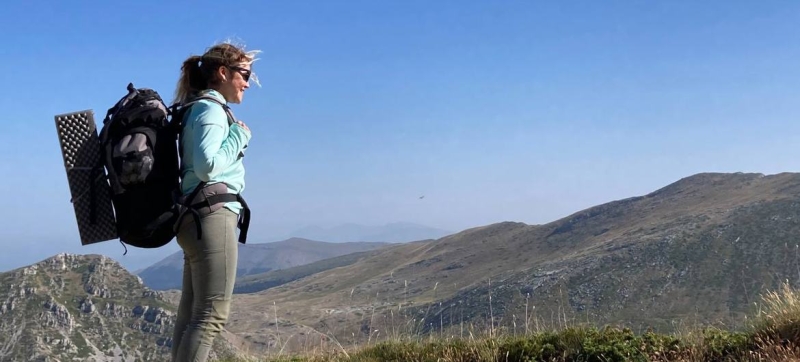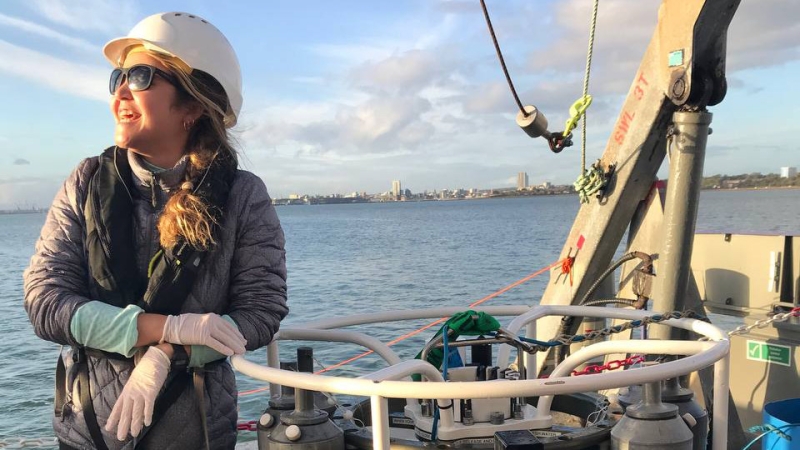
Marine biologist and geologist Valeria Vakhitova. INTERVIEW | Researcher from Vladivostok on science, ecology and women’s rights in the fishing industry Women
Valeria Vakhitova is a marine biologist and geologist from Vladivostok. Her interests combine oceanography, ecosystem protection, and women’s rights in the fishing industry. Ahead of the International Day of Women and Girls in Science on February 11, Evgenia Kleshcheva from the UN News Service spoke to the young researcher about her work and the prospects for girls in environmental projects.
EK: How did you get into this field?
VV: I studied at a liberal arts and sciences university in the United States for my undergraduate degree. Until the end of my second year, I could choose which area to focus on. At first, I was interested in different areas: I studied dance, Italian. But then I got into an oceanography course, which I really liked. In the summer, I worked on a boat on Lake Champlain, and then I realized that I was interested in geology and especially oceanography. Even though I lived in Vermont, where there is no sea, I realized that my connection to the ocean, born in Vladivostok, had not disappeared.
After my undergrad, I worked at two universities and did research on mangroves and coral reefs, while simultaneously applying to graduate programs in marine biology.
EK: What are you doing now??
BB: I currently work at the United Nations Environment Programme’s Conservation Monitoring Centre, which is located in England, Cambridge. My team analyses data on nature reserves and conservation as part of Task 3 of the Kunming-Montreal Global Biodiversity Framework. This includes both land and marine reserves.
Read also:
UN report: protecting 30 per cent of planet’s territory by 2030 is still possible, but more action is needed actions
I will soon be moving to UNEP headquarters in Kenya, where I will be working on marine governance, which is the regulation and protection of marine resources through laws, policies and international agreements.
EK: What are your main research interests??
BB: I am very passionate about the fishing industry and everything related to marine resource management and fishing.
During my master’s degree, I wrote a thesis with the Food and Agriculture Organization (FAO), where I analyzed women’s rights in the fishing industry. I was interested in learning not only about the fish itself, but also about the work of the people involved in its production.
I was lucky enough to communicate with many fishermen, since in Vladivostok it is a large community. For example, my aunt goes to sea for months, and I could learn from her about working conditions and women’s problems. For example, on ships it is always very cold to store fish, and women may be afraid of reproductive problems because of this.
EC: This paper on women in fisheries was published as a report jointly with FAO…
BB: Yes, we worked with the Regional Centre for the Fishing Industry for the Mediterranean and Black Seas and analysed the situation in the countries surrounding these seas. In addition to the main annual report, we released a report on this region, making it specific and focusing on women in the fishing industry. In the first In part we analyzed statistics, and in the second part we interviewed women, and this seemed to me the most interesting, because no one had ever created a report like this. There are some advanced countries that are doing this, but this has never happened at the regional level. It was interesting to understand and compare what women do in the fishing industry in the countries of the region.
EK:What were the interesting aspects and results of the study?

Marine biologist and geologist Valeria Vakhitova.
VV: For me, as an outsider, it was interesting to talk to women in the fishing industry. The biggest takeaway for me was that women’s work is often so invisible that no one even asks whether it is work. For example, when women cook, clean, wash dishes, we don’t ask ourselves the question of the cost of labor.
And in this regard, in the fishing industry, we found out how much unpaid labor women do. Very often they help with bookkeeping. Husbands go to sea, and women stay with the children, and this is also considered work, and it really supports the family business.
Women knit nets, mend them, repair equipment while men go to sea. Very often this is done “behind the scenes”, and no one pays attention to it. But this is also work that supports the fishing industry and is very important.
EK: If we go back to the field of science, are there similar problems or different barriers there? How can we attract more girls to science, especially environmental research?
VV: When I was studying, there were always more women than men in my classes. And I think there is a reason for this, which is related to patriarchy. Very often, both in the field of environmental protection and in academia, they don’t pay enough. And, unfortunately, because we’ve become accustomed to being paid less than men, women can turn a blind eye to this and work in poor conditions. Therefore, I believe that the issue is not about attracting more women to entry-level positions, but about ensuring that women receive the same income as men.
EK: In this regard, what would you say to young women or girls who are thinking about a career in science and environmental science? And what can you say to those who have influence on the system?
VV: For managers, for companies that provide grants, I would like to say that wages should be more fair. For example, a lot of women are in entry-level positions because they cannot move up to the next levels and gain access to opportunities. There will be far fewer women in higher positions.
I would like to draw attention to the fact that entry-level positions are not paid competitively, and because of this, the industry ultimately leaves more privileged people who do not have to think about how to feed themselves and their families. That is, if you want more equality in higher positions, then think about how work is paid at entry levels. This will be support not only for women, but also for any less privileged group.
And, of course, women need to be resourceful. If you have love for some area, it is very important to constantly remind yourself why you are doing it, because there will be many obstacles, it will not always be easy, but there are opportunities.
And, of course, it is very important to help each other. This is a very big resource – reaching out to other women in other positions, even those not quite in your field. And very often women respond. The main advice and wish is to help each other.
